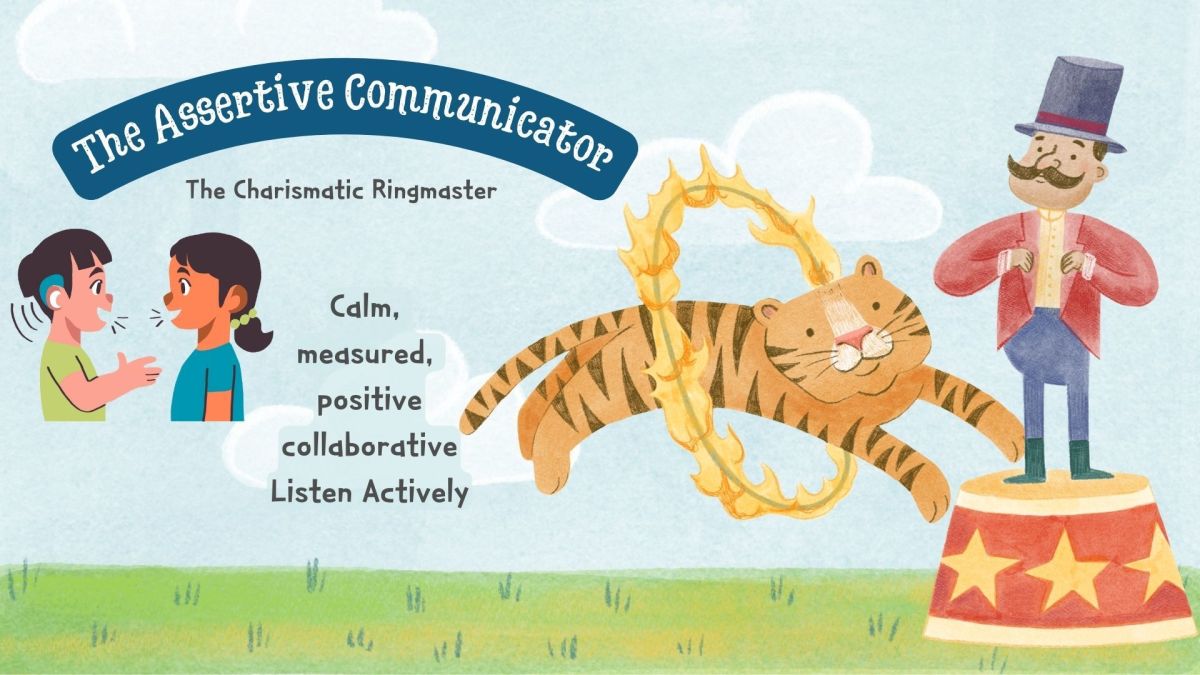Assertive Training Course
Assertive Training Course
Assertive Behavior - Part One
Are you a passive person? Do you find it difficult to say, No?
Are you an aggressive person? Is your credo, “my way or the highway”?
Are you an assertive person? Can you stand up for yourself without putting someone else down?
Or are you not sure which of the three is your behavioral style?
If you want to know more about assertiveness, you have come to the right place. I taught an assertive training course called “Assertive Behavior” in a community college for several years. So many students signed up for the course, we had to move it from a standard-size classroom to an auditorium. The college administrators were very surprised. I was not.
Assertiveness is a skill we can learn to use for our benefit, but not everyone knows exactly what it is and how to use it.
The assertive training
course I taught required six weeks to complete, with homework assignments and weekly
attendance. I have boiled down the requisites and “meat” of this assertive
training course to two parts. My hub, “The
Abilene Paradox,” was the Introduction, If you haven’t already done so,
please read it now. Thank you.

Okay. Let’s get started. Here is a typical situation. Your brand new toaster won’t work. You return it to the store. Even though there is an exchange policy for defective merchandise, the sales associate gives you an argument hinting darkly that you probably broke the toaster by abusing it. What do you do?
a – You are uncomfortable “making waves” so you turn around meekly and leave with your brand new but broken toaster.
b – You raise your voice, call the sales associate several unprintable names and demand to see the manager.
c – You calmly show the sales associate your receipt, remind him or her of the store’s exchange policy, firmly ask for a replacement or your money back – and hold your ground until you are satisfied.
If you answered “a” – you were passive or unassertive. You surrendered a right you are entitled to.
If you answered “b” – you behaved aggressively. You used bullying, humiliating tactics to put the other person down and get your way.
If you answered “c” – Bravo! You behaved assertively. You stood up for your rights and did not put down the other individual.

Why is it important to be more assertive in your life? Because being assertive is the best way to deal with the conflicts and frustrations of everyday living. It helps you reach your goals and usually enables you to do so peaceably. So why do so many people have difficulty being assertive? The answer is simple.
Because it involves taking a risk. There is no risk if you are passive and do or say nothing. You may feel guilty later but you can rationalize it away.
If you are aggressive, you may label your behavior “assertive” and go on your merry, demeaning way.
So what do these labels – passive, aggressive, assertive – really mean? Some operational definitions may be helpful here.
Passive is failing to stand up for yourself, or standing up for yourself in such an ineffectual manner that your rights are easily violated. You allow others to take advantage of you. You are a doormat and have difficulty saying no. ”Yes, I can stay late again to . . . ” or “Well I had planned to . . . but I guess I could . . . “
“You are nobody’s victim without your permission.” – Eleanor Roosevelt


Aggressive is standing up for yourself in such a way that the rights of the other person are violated in the process. You are indifferent to the reactions of others – you care little about their feelings. You may often humiliate or put down other people. You are a tyrant. “I want this done now and this way, even if you have to stay late!” or “What are you talking about? Are you a moron?”
Or you may use any other favorite epithet of aggressives like “stupid, imbecile, ignorant, dummy, alien from another planet, noob, boob, rube,” etc.
"What's good for General Bullmoose is good for the country!" - General Bullmoose
Assertive is
standing up for yourself in such a way that you do not violate the basic rights
of other people. It’s a direct, honest and appropriate expression of your
feelings and opinions which you express without putting down someone else. You
are self-confident, reasonable, and not confrontational. “Here’s the task – how can we accomplish it within the timeline?” or "I would like to understand your viewpoint. Can you tell me why . . . "
"It takes courage to grow up and become who you really are." - e.e. Cummings
Excellent Books on Assertiveness
Assertiveness is Good for You
Assertiveness is standing up for your rights calmly and persistently – it is the happy medium on a continuum between passiveness and aggressiveness. Being unassertive or passive – a doormat – leaves you with the short end of the stick. Being aggressive which may appear to work for the moment will take an eventual toll on you and the people you live and work with.
Why should you consider an Assertive Training Course?
An Assertive Training Course will teach you that you have a right to ask for things, including reasonable changes in another person's conduct.
Suppose someone cuts in line in front of you at the supermarket checkout line. If you firmly but politely ask the person to go to the end of the line, you are being assertive. If the steak you ordered medium rare arrives well done, you ask the waiter to replace it. You are being assertive. Many people simply are not able nor willing to do this.
Assertiveness can boost your self esteem,build confidence, and reduce your level of personal stress. Almost like Xanax. But safer. Assertive people feel good about themselves and their abilities,respond well to difficult situations, and manage their time effectively by saying no to unreasonable demands.
Are you still uncertain whether you are assertive or not? Here’s another easy way to check out your assertiveness:
Test Your Assertive Skills
Answer Yes or No to each statement below that describes your behavior:
• I have a difficult time telling family members and friends that they have done something that offends me.
• I say yes quickly to requests before taking the time to consider what the request involves, or the time it may take.
• Sometimes it is difficult for me to hang up the phone on telemarketers, or to tell salespeople in stores that I am just window shopping.
• Voicing my opinion when a group is discussing an important matter is difficult, even when I think my opinion is valuable.
• I feel uncomfortable, even incompetent at times, when I have to ask for clarification when I am confused about or don't understand what someone has said.
• I do not accept criticism well. I often get resentful or overreact to others who find fault in my performance or my actions.
• I have difficulty accepting compliments and often downplay my accomplishments or appearance.
• Requesting favors from others is something I do not often do.
• I find it difficult to tell people that I have changed my mind after I have agreed to do something for them.
• Returning an improperly prepared meal in a restaurant, or a defective item purchased in a store is difficult for me.

Now count the number of times you answered, "yes." Did you answer “Yes” to three or more of these questions? Then you are in the right place. And you are probably thinking - if being assertive is so important and the most positive way to act, why do so many people have problems being assertive?
in addition to not wanting to take a risk, many of us believe the irrational myths that exist about being assertive that we have already bought into while growing up. Here are some of these myths I know you have encountered:
• Myth #1 – Other people will become angry with me If I assert myself, if I stand up for my rights.
Reality – Not so. If I assert myself, the effects may be positive, negative or neutral. However, since being assertive involves legitimate rights, I believe the odds are in my favor to have some positive result. I can’t go around being a doormat and not asserting my rights.
“Make the most of yourself, for that is all there is of you.” – Ralph Waldo Emerson
• Myth #2 – If I assert myself and people do
become angry with me, I will be devastated and feel terrible.
Reality – Not so. Even if others do become angry and unpleasant, I am capable of handling it without falling apart. If I assert myself when it is appropriate, I do not have to feel responsible for their anger. It may be their problem.
• Myth #3 – Although I prefer others to be straightforward with me, I'm afraid that if I am open and direct with others and say no, I will hurt them.
Reality – Not so. If I'm assertive, other people may or may not feel hurt. Most people are not more fragile than I am. If I prefer to be dealt with directly, quite likely others will, too.

• Myth #4 – At all costs, I must avoid making statements and asking questions that might make me look ignorant or stupid.
Reality –
Just not so. It is not shameful to lack information or to make a mistake. It
just shows I am human. Asking questions reflects confidence and competence. No one knows everything, and no one is perfect.
"Have no fear of perfection - you'll never reach it." - Salvador Dali
• Myth #5 – If my assertiveness hurts others, then I am responsible for their hurt feelings.
Reality – No way. Even if others do feel hurt by my assertive behavior, I can let them know I care for them while also being direct about what I need or want. Although at times others may be surprised by my assertive behavior, most people are not so vulnerable and fragile that they will be shattered by it.
• Myth #6 – It is wrong and selfish to turn down legitimate requests. Other people will think I'm terrible and won't like me.
Reality – Not
true. Even legitimate requests can be refused assertively. It is perfectly acceptable to consider my own needs - sometimes before those of others. I cannot
please all of the people all of the time. The more decisive I am, the more
critics I may have. That is not my problem.
• Myth #7 – Some people call assertive people bitches and bastards. If I'm assertive, I'll be so unpleasant that people won't like me.
Reality – Not so. Assertive people are direct and honest, and behave appropriately. They show a genuine concern for other people's rights and feelings as well as their own. When you are assertive others are more likely to respect you.
"Use soft words and hard arguments." - English proverb




Now that you are aware of the irrational myths you must ignore, you must overcome the anxiety that prevents you from behaving assertively. Your imagination can get in the way: “I would make the boss mad if I asked for a raise.” Is the image of an angry boss a realistic one or just your own private scenario?
Fear of angering the boss is real enough, but if you verbalize your request politely and assertively, and select the right moment, there is the possibility of achieving your goal. If you don’t change and behave assertively, the person you become most angry with is yourself.
“I wanted to change the world. But I have found that the only thing one can be sure of changing is oneself.” – Aldous Huxley
Assertive behavior can be effective in many situations – not just when someone cuts into your line, your steak is inedible, or your raise is overdue. It all depends on your ability to size up the situation, decide on your response, and then make it happen without allowing the other person’s negative reaction or anger to sidetrack you. Once you take the risk, you find out that your worst fears are seldom realized. Where aggression is a tactic of war, assertion seeks to negotiate – you use diplomacy.
"Diplomacy is the art of saying, 'Nice doggie' until you can find a rock." - Will Rogers
Is it difficult for you to speak up? Then use what psychologists call "successive approximation," a term that means trying to go part of the way toward a goal. Learn to make just one assertive statement.
“I am always ready to learn although I do not always like being taught.” – Winston Churchill
For example, at the supermarket checkout line, request the bag-person to bag your groceries in two plastic bags, one within the other, instead of only one. On the next visit, request two paper bags instead of plastic. Each small success will reinforce your blossoming assertiveness.
The process of becoming assertive is almost like magic. You start being assertive by using assertive language and behavior. You may not feel more assertive yet but you are using the most assertive language, verbal and non-verbal (body language). Soon other people start to see you as assertive.
And here is where the magic kicks in. You start to feel good about yourself for speaking up, for displaying your new-found assertiveness. You begin to see yourself as assertive. Your self esteem increases and presto, change-o, you are assertive!
"How many cares one loses when one decides not to be something but to be someone." - Gabrielle 'Coco' Chanel
Oh, almost forgot. Your homework is to go to the market, purchase something that weighs two pounds or more, and ask for double plastic bags. You can graduate later to paper.
Stay tuned for Part Two of the Assertive Training Course: “How to Say No,” which includes the most effective assertive verbal and body language for you to use. Coming soon.
© Copyright BJ Rakow Ph.D. 2010, 2011. All rights reserved. Author, "Much of What You Know about Job Search Just Ain't So." Book includes how to write a dynamic resume and cover letter, network effectively, interview professionally, and negotiate assertively. Also a chapter for older workers.
Three more very useful Hubs
- Do You Speak Manguage?
Do men have their own language in spoken and written form? The differences between males and females on paper....how do we portray ourselves? - Take the PIG Personality Test
Are you open to learning more about your personality preferences? Then here are the simple instructions. 1 - Take out a blank piece of 8 ½ x 11 inch paper. 2 - Now draw a pig. Those are the instructions for the... - Are You A Big P.A.I.N. ?
Do you or someone you know use passive agressive strategies to deal with other people?










